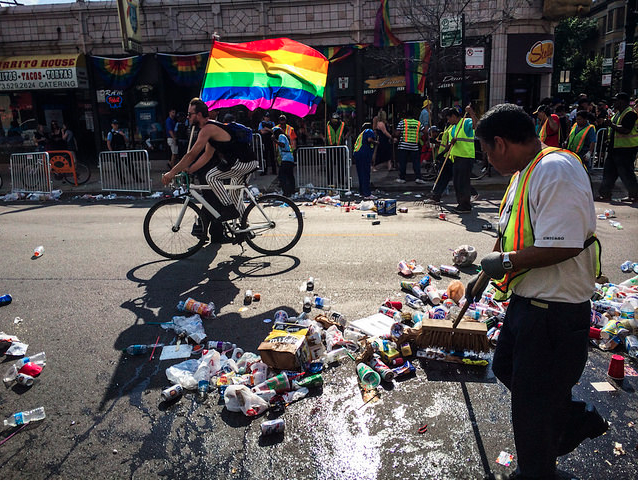The Future Of Pride Parade In Boystown Remains Uncertain After 2015
By Margaret Paulson in News on Apr 28, 2015 5:05PM
City officials and aldermen have announced that while the Pride Parade will remain in Boystown this year, they have very real intentions of moving it elsewhere in 2016 if things get out of hand this June.
According to DNAinfo Chicago, 44th Ward Alderman Tom Tunney and Alderman James Cappleman of the 46th Ward have been in talks with the Mayor’s Office for several months regarding behavior at the parade. On Monday night, the two issued a joint statement with the Department of Cultural Affairs and Special Events meant to serve as a warning for revelers to be on their best behavior:
“"We ask for your support in keeping the parade safe by celebrating both responsibly and respectfully. If we do not see significant improvement this year, it may be the last year that the parade is in our community.”
This isn’t the first mention of moving the Pride Parade elsewhere. After 2014’s parade— which had 1 million attendants but only eight arrests— Tunney suggested that moving the parade to another neighborhood was one way to cull neighbors’ complaints of public intoxication and all-night noise. (Though Lakeview is an especially dense neighborhood, it’s truly hard to see the logic in this argument, unless Tunney is just trying to get rid of the hassle for his office. Wouldn’t these complaints happen in other neighborhoods, too?)
In recent years, as attendance at the Pride Parade and Pride Fest has soared from an estimated 450,000 people in 2005 to 850,000 in 2012 and more than 1 million people per year in 2013 and 2014, officials have instituted new measures to keep the revelry under control, including rerouting the parade to end closer to Uptown. In 2009, barricades were installed to prevent the crowd from joining the parade, which was par for the course in the past. Additionally, as of 2009, people riding on floats aren’t allowed to leave them once the parade has started. In 2014 Mayor Emanuel instituted a $1,000 fine for any partiers caught drinking in public at the parade (the previous maximum fine was $500). If offenders don’t pay up or don’t show up in court, they’ll possibly face six months of jail time.
In 2013, the biggest change to Pride Weekend was the decisions by the Northalsted Business Alliance to hold Pride over two successive weekends in June. Previously, Pride Fest was held on Friday and Saturday, followed by the Pride Parade on Sunday. Starting in 2013, Pride Fest and the parade were split up. This year, Pride Fest will be held June 20-21 and the Pride Parade will be Sunday, June 28.
If Chicago’s Pride Parade were moved in 2016, it would be a huge blow— both economically and culturally— to the Boystown community where the parade has been held since 1971. Boystown is known as the first “official gay community” in the country when it was designated as such in 1997 by Mayor Richard M. Daley. The mayor gave the area a $3.2 million upgrade as part of the Neighborhoods Alive program in 1998 and installed the neighborhood’s iconic rainbow pylons on Halsted Street. But, long before that, the first official gay bar in the area, Little Jim’s, opened on Halsted in 1975 and it is still in business today.
Hopefully organizers and the city can reach a compromise to keep neighbors relatively happy. In 2014, we outlined a few fixes. Another idea may be to hold the parade on Saturday rather than on a Sunday, when neighbors are more likely to tolerate late-night celebrations because they don’t have to wake up early for work the next day.
Chicago’s Pride Parade is famous worldwide and it’d be sad to see it leave the neighborhood instrumental to its birth.
